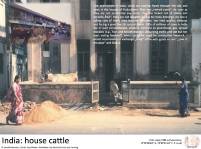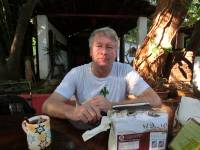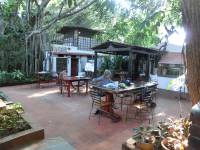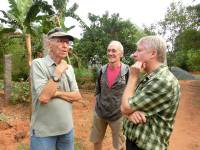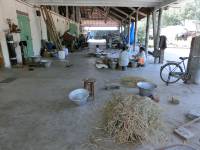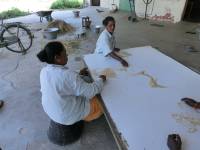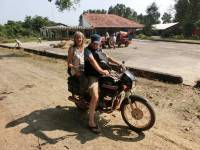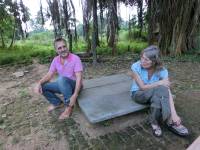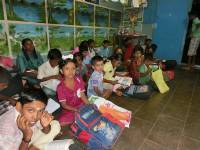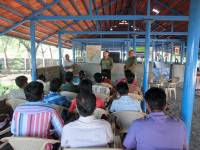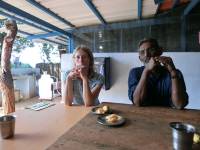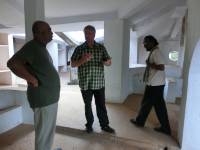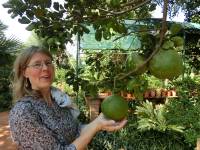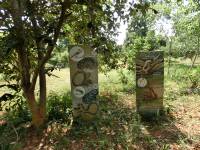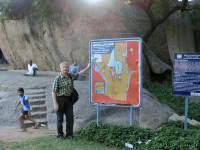Guru Geri in India
In 1986 I was 3 months with Suse Seegers in India, visited Roland and Siggi in Auroville, an global community near Pondycherry. First time in my life buffalo feeding and rice cultivation. We worked many days to construct the matranmandir temple (the concrete sceleton building). On the way there I was in Mysore, Bangalore, Bombay, Goa, Madras (Chennai). A round trip in South India. But most of the time in the Ashram, which I found very exciting, even though I personally am not receptive to spiritual ideology. I enjoyed farming and it was great what kind of houses were built there. Potheads were present en masse and many do-gooders who were not necessarily the winners in their home cultures. In the cheap hotels you always had to be careful not to hide any drugs that the hotel manager had hidden in order to report his guests and collect premiums. India is an enormously beautiful and diverse country. Suse found the poverty very bad and had more often a nervous breakdown. The national park with the tigers and elephants near Mysore was rather her taste. In Bombay we visited her friend from Germany, who comes from this city.
2015 the second time in India, this time with Klaudia. Flying from Sri Lanka to Madurai, picked up there by Sundeep (Bio.-Dyn. India) and taken to Sivakar, to the School of Biodynamic Farming. Very nice people, good tasks. Everything very rural. Then to Auroville, 28 years after the first time. Didn't recognize much on Auroville Orchard, Auroville MatriMandir (the dome), but was a great stay for 10 days. I would have liked Ayla, too. I stayed in the Sharnga guest house, a place to relax. By bike through Auroville. The border to non-Auroville is still marked by garbage: much cultural exchange between the 1500 non-Indian Aurovillians (300 Germans alone) and the Tamils takes place only on working level. During their stay Lucas Dengel (doctor, Bio-Dyn. India chairman, very nice) talked a lot with them. The Sindakar representatives also came to discuss the concept with me. Compared to 1986 I have matured, now World IFOAM board member, ISOFAR president, editor of eco-scientific journals and director Thünen. Suddenly man is perceived, which was not the case in 1986.
It struck me that the country is even more densely populated than 1984 (700 million more), that there is rubbish everywhere that causes cows climate change, although they do not produce as "retired cattle" but cannot be slaughtered either. Auroville (40 sqkm) has become very rainforest-like, and therefore probably contributes to the lack of groundwater in the region, because the rainwater is not enough for the many trees. The shade and the humidified air in this semi-arid region is very worth living in, if not forever (sustainable). But for the approximately 1500 non-Indians from 42 countries it is pleasant until they return home, where it is permanently safer and perhaps also more pleasant in old age.
2017 the third time in India, this time 8 days in Delhi, at the 19th Organic World Congress, which I co-organized. There I was in the worst smog since measurements were made, with well over 1000 microgramm/m3 air (measurement limit). I was glad to be able to fly home again and to have good air.
In 2023 I was the 4th time in India, this time in Hyderabad and Andhra Pradesh. AHT has contracted me to help to establish an Agroecological Research Centre in Pulivendula, in the system approach of Natural Farming. 12 days I have spend in visiting 7 days, several research institutions (Livestock Institute, Rice Institute, Horticulture Institute) and discussed with many stakeholders and the project CEOs the start of the 25 mio Euro project (20 mio Euro are funded by KfW). I liked a lot the high motivation of the people, the good farmers practice and the target, to work pesticide free. 2024 I was 14 days the second mission for IGGAARL (Indian German Global Academy in Agroecology for Research and Learning) in Hyderabad, Guntur and Pulivendula. I visited many farms, gave a lot of training for farmers, scientists and adminstrition staff of RySS (Natural Farming).
